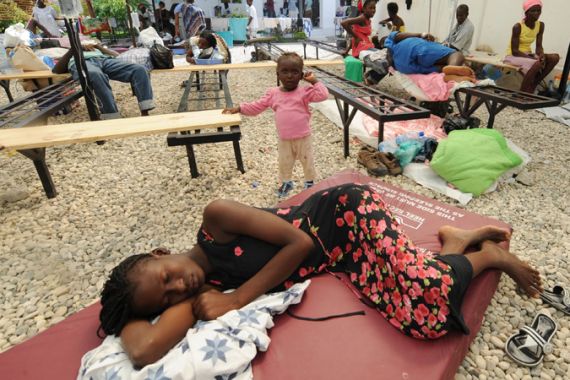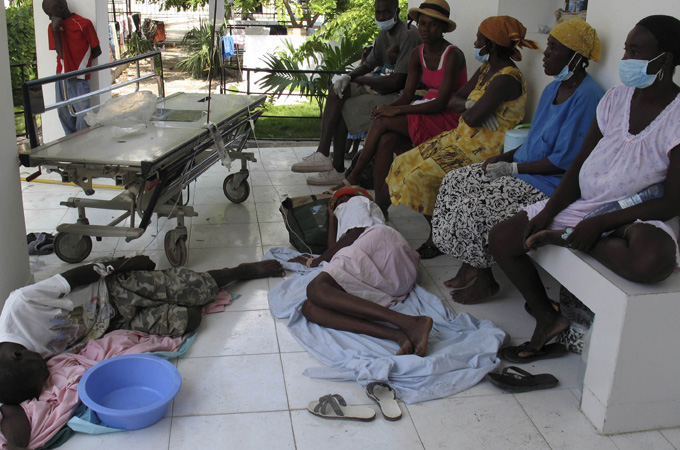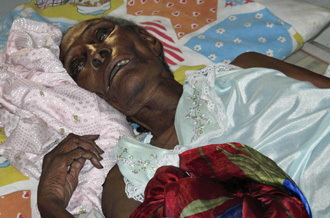Haiti cholera death toll passes 250
At least five cases of the disease discovered in Port-au-Prince, but UN official believes fatality rate is slowing.

A cholera outbreak in Haiti has now claimed more than 250 lives with cases being reported for the first time in the capital, Port-au-Prince.
The announcement by Haitian health officials on Saturday that five cholera cases had been confirmed in the capital stoked fears that the disease could spread rapidly among hundreds of thousands of survivors of the January 12 earthquake who are sheltered in camps there.
Keep reading
list of 4 itemsDeadly Sahel heatwave caused by ‘human-induced’ climate change: Study
Woman, seeking loan, wheels corpse into Brazilian bank
UK set to ban tobacco sales for a ‘smoke-free’ generation. Will it work?
But a high-ranking UN official told Al Jazeera on Sunday he believed the outbreak is coming under control.
Nigel Fisher, the UN deputy special representative for Haiti, said that although 253 people have died, the fatality rate has stabilised and the ratio of deaths to total cases has declined.
But he still emphasised the need to keep Haitians informed about how to prevent the spread of the disease.
“People need to know what to do first of all to protect themselves and to prevent the outbreak,” Fisher said. “So messages have gone out … about the importance of hand washing, boiling water, eating cooked food”.
Lack of awareness
Al Jazeera’s Craig Mauro, reporting from the capital’s National Hospital, said many residents of Port-au-Prince said they were not even aware of the cholera outbreak.
One doctor specialising in infectious diseases told our correspondent that he believed the health system could control an outbreak in the city, but that the hospital had only 20 beds set aside for serious cases.
The first cases confirmed in Port-au-Prince since the epidemic started were people who had become infected in the main outbreak zone of Artibonite, north of Port-au-Prince, UN officials told Al Jazeera, citing the Haitian ministry of health.
The five had subsequently travelled to the capital, where they fell ill and are now being treated.
“These cases thus do not represent a spread of the epidemic because this is not a new location of infection,” the UN’s Office for the Co-ordination of Humanitarian Affairs said.
They are among more than 3,000 people who were infected in an outbreak mostly centered in the rural Artibonite region. Officials have warned that the death toll could rise as they reach hard-to-access areas.
Al Jazeera first discovered on Saturday that two suspected cholera patients were being treated at Port-au-Prince’s National Hospital. Sebastian Walker, reporting from the capital, tracked one patient to a poor neighbourhood in the city.
Rosalind Alsaintdor told our correspondent that she had been suffering from acute diarrhoea and was told by doctors she would receive the result of her cholera test on Monday.
Containing the disease
Walker said the confirmed cases in the capital represent a very significant development.
“It’s really the news that everyone here has been fearing,” he said. “All of these victims are still alive but they have been confirmed sick with cholera. They have also all travelled back from that disease zone; they are not patients who contracted the disease here in the capital.”
 |
| More than 2,000 people have been infected in the outbreak [Reuters] |
Walker said the main priority for health officials now is containing the disease.
“The main focus is on the IDP (internally displaced person) camps. You have 1.3 million people living in very squalid conditions, conditions in which health officials have told us are breeding grounds for disease – very poor levels of sanitation, almost no drinking water.”
Another problem in the camps is a lack of clean drinking water. Residents told Al Jazeera the water delivered routinely by the Red Cross in tankers makes them sick.
If the disease spreads into camps where those left homeless by the January earthquake are sheltering, a public health crisis could be imminent. More than 250,000 people were killed in the earthquake and another 1.2 million left homeless.
“It will be very, very dangerous,” Claude Surena, president of the Haitian Medical Association, said. “Port-au-Prince already has more than 2.4 million people, and the way they are living is dangerous enough already. Clearly a lot more needs to be done.”
The first two cholera cases outside the Artibonite region were confirmed in Arcahaie, a town closer to the capital.
Experts were also investigating possible cases in Croix-des-Bouquet, a suburb of the capital, and radio reports said there were two dozen cases of diarrhoea, which can be a symptom of cholera, on Gonave Island across the Gulf of Gonave from the capital.
State of emergency
Cholera is a bacterial illness that infects the small intestine. It is spread primarily through contaminated drinking water and can also pass between humans through faecal matter. Severe dehydration, one of cholera’s effects, can kill a small child in four hours if not treated.
Aid groups and the government were rushing medical teams, medicine, clean water and water purification to the affected areas. The health ministry also declared a state of emergency in Artibonite.
 |
| Cholera can kill within hours if not treated in time [AFP] |
Cholera treatment centres ave been set up to isolate patients in the two worst affected provinces and in Port-au-Prince.
Officials have urged residents to take preventative action.
“Chlorine is being provided so to take advantage of those measures that will ensure that anything ingested whether it be water or food is properly prepared and that the source of the water is safe and adequately treated,” Jon Andrus, the deputy director of the Pan American Health Organisation, said.
Andrus said the number of cases will continue to grow because Haitians do not have any built-up immunity to cholera.
“As we know from our experience, with situations of cholera where there is no infrastructure to deal with the crisis, it just gets much worse. We have to expect that and react to it.”
This is the first time cholera has struck Haiti since 1960, according to the UN.
UN representative Fisher said a nationwide anti-cholera health education campaign was under way, using radio announcements in Creole and even text messages sent to mobile phone owners.
Cholera is transmitted by water but also by food that has been in contact with unclean water contaminated by cholera bacteria. The disease is easily treatable by rehydration and antibiotics but can kill within hours if not treated.